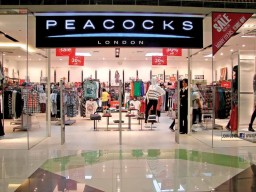
Banking on the opportunity to buy an established retailer, with a very loyal customer following and committed employees, Scotland-based EWM now owns 338 stores, 57 concessions, three distribution centres and the head office of Peacocks for £ 23m with money being pumped in to rebuild infrastructure, IT, the supply chain and stock. “Peacocks is a Cardiff-based Welsh business, and we are very keen as a group to make sure that all our businesses keep their local identity. We look forward to working with our new colleagues to rebuild the business in what is a very tough economic environment for High Street retailers in the UK, to try and get Peacocks back on its feet again,” says Philip Day, Chairman and Chief Executive of the Edinburgh Woollen Mill Group, based in Langholm in Scotland.
Losing sight of its core customers with too much of a focus on high fashion items that would go from the best to the worst seller in under a month, the strategy now is to review Peacocks’ exit price points, which lately were reported to have become very expensive and therefore in the future the entry price points will be maintained to offer the customers good value and added value through design. Elaborating on the same, Philip said, “The model typically seen in the likes of Top Shop and Primark is not what Peacocks is about. The clothes in future will be less expensive and appeal more to its traditional customer base.”
The priority has been to put the buying team back together as EWM also believes that when it is a fashion business they are the most important people to retain. Another big problem that the brand faced was the fact that it was opening anytime, anywhere. In future, the company expects to be more selective with less expensive city centre locations and more units in town centres and on suburban High Streets that are commercially attractive, looking for profitability, geographical spread of stores, where their nearest competitors like Matalan and Primark are.
According to reports, recent with the suppliers is the company’s strategy to ask for a 90 days credit on payment. This in turn has resulted into a much talked about unsustainable pressure on small companies in the Peacocks supply chain that would effectively mean that only larger suppliers with cash reserves would be able to continue trading with the group. However, basing it on a better position that the brand has today due to Edinburgh Woollen Mills’ AAA rating, Philip is positive that the suppliers will be able to get better credit insurance through EWM. “Almost all suppliers have agreed to the extension. There are one or two smaller suppliers that decided not to go ahead. A 90-day credit payment is standard within retail,” he says.
Earning the reputation of creating one of the UK’s biggest High Street groups and turning around troubled companies last summer EWM bought the Jane Norman fashion brand and 33 stores from administration, and now hopes that business for Peacocks will have a bigger presence on the UK High Street than it had before. On a long-term strategy in five years time the brand aims to have 700 stores in the UK and southern Ireland along with a launch of a new internet model in 2013.






